法律英语试题与答案
法考英语试题及答案

法考英语试题及答案一、选择题(每题1分,共10分)1. The defendant in a criminal case is entitled to ________.A. a fair trialB. a quick trialC. a public trialD. all of the above2. Which of the following is NOT a fundamental principle of criminal law?A. the presumption of innocenceB. the right to legal representationC. the right to a jury trialD. the prohibition of double jeopardy3. The term "actus reus" refers to the ________.A. guilty mindB. guilty actC. guilty intentionD. guilty knowledge4. In legal terms, "mens rea" is the Latin term for ________.A. the actB. the crimeC. the intentD. the punishment5. The doctrine of "res ipsa loquitur" implies that ________.A. the burden of proof is on the defendantB. the facts speak for themselvesC. the defendant is presumed guiltyD. the plaintiff must prove intent6. Which of the following is NOT a type of legal document?A. summonsB. subpoenaC. indictmentD. invoice7. The right to remain silent is a protection against________.A. self-incriminationB. false accusationsC. harassmentD. defamation8. A "plea bargain" is an agreement between the defendant and the prosecution to ________.A. admit guilt in exchange for a reduced sentenceB. change the chargesC. request a new trialD. appeal the case9. The "exclusionary rule" in criminal procedure means that ________.A. evidence obtained illegally is admissibleB. evidence must be presented in a certain orderC. illegally obtained evidence is not admissible in courtD. evidence must be presented within a certain time frame10. The term "habeas corpus" is used to challenge ________.A. the legality of detentionB. the severity of a sentenceC. the validity of a convictionD. the appropriateness of a plea bargain二、填空题(每空1分,共10分)11. In a criminal trial, the burden of proof lies with the________.12. The term "due process" refers to the fundamental rights that must be respected in legal proceedings to ensure a fair trial.13. A "witness" is a person who has observed an event and can provide ________ testimony.14. The "right to confront" allows a defendant to ________ witnesses against them.15. A "class action" is a type of lawsuit in which a large group of people with similar claims sues as a single entity.16. The "Bill of Rights" is the first ten amendments to the U.S. Constitution, which includes protections for ________ rights.17. A "default judgment" is entered when the defendant fails to ________ in a lawsuit.18. The "emolument clause" in the U.S. Constitution prohibits government officials from receiving gifts from foreign entities.19. "Judicial review" is the power of the courts to determine the constitutionality of laws and government actions.20. "Probable cause" is the standard used to determine if there is sufficient reason to believe a crime has beencommitted and to justify ________.三、简答题(每题5分,共20分)21. Explain the concept of "double jeopardy" in criminal law.22. What are the rights of a defendant during a trial?23. Describe the process of a "grand jury" in the context of criminal law.24. What is the purpose of "voir dire" in a jury selection process?四、案例分析题(每题15分,共30分)25. A defendant is accused of a crime but has an alibi that places him in another city at the time of the crime. How might this affect the outcome of the trial?26. Discuss the implications of the "Miranda warning" for law enforcement and suspects during an arrest.五、论述题(30分)27. Discuss the importance of the "right to a fair and speedy trial" and how it is safeguarded in the legal system.答案:一、选择题1. D2. C3. B4. C5. B6. D7. A8. A9. C10. A二、填空题11. prosecution12. due process13. testimonial14. cross-examine15. legal16. fundamental17. appear。
法律英语试题答案
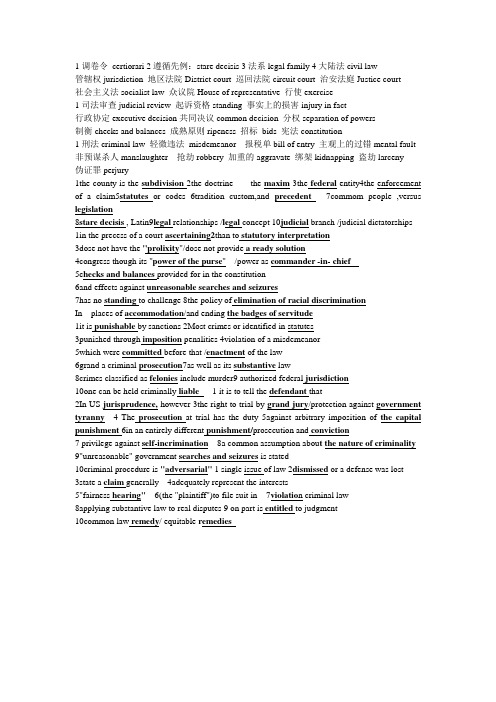
1调卷令certiorari 2遵循先例:stare decisis 3法系legal family 4大陆法civil law管辖权jurisdiction 地区法院District court 巡回法院circuit court 治安法庭Justice court社会主义法socialist law 众议院House of representative 行使exercise1司法审查judicial review 起诉资格standing 事实上的损害injury in fact行政协定executive decision共同决议common decision 分权separation of powers制衡checks and balances 成熟原则ripeness 招标bids 宪法constitution1刑法criminal law 轻微违法misdemeanor 报税单bill of entry 主观上的过错mental fault 非预谋杀人manslaughter 抢劫robbery 加重的aggravate 绑架kidnapping 盗劫larceny伪证罪perjury1the county is the subdivision 2the doctrine ---the maxim 3the federal entity4the enforcement of a claim5statutes or codes 6tradition custom,and precedent 7commom people ,versus legislation8stare decisis , Latin9legal relationships /legal concept 10judicial branch /judicial dictatorships 1in the precess of a court ascertaining2than to statutory interpretation3dose not have the ''prolixity"/dose not provide a ready solution4congress though its "power of the purse" /power as commander -in- chief5c hecks and balances provided for in the constitution6and effects against unreasonable searches and seizures7has no standing to challenge 8the policy of elimination of racial discriminationIn places of accommodation/and ending the badges of servitude1it is punishable by sanctions 2Most crimes or identified in statutes3punished through imposition penalities 4violation of a misdemeanor5which were committed before that /enactment of the law6grand a criminal prosecution7as well as its substantive law8crimes classified as felonies include murder9 authorized federal jurisdiction10one can be held criminally liable 1 it is to tell the defendant that2In US jurisprudence, however 3the right to trial by grand jury/protection against government tyranny 4 The prosecution at trial has the duty 5against arbitrary imposition of the capital punishment 6in an entirely different punishment/prosecution and conviction7 privilege against self-incrimination8a common assumption abou t the nature of criminality 9"unreasonable" government searches and seizures is stated10criminal procedure is "adversarial" 1 single issue of law 2dismissed or a defense was lost3state a claim generally 4adequately represent the interests5"fairness hearing" 6(the "plaintiff")to file suit in 7violatio n criminal law8applying substantive law to real disputes 9 on part is entitled to judgment10common law remedy/ equitable remedies。
法律英语练习题答案
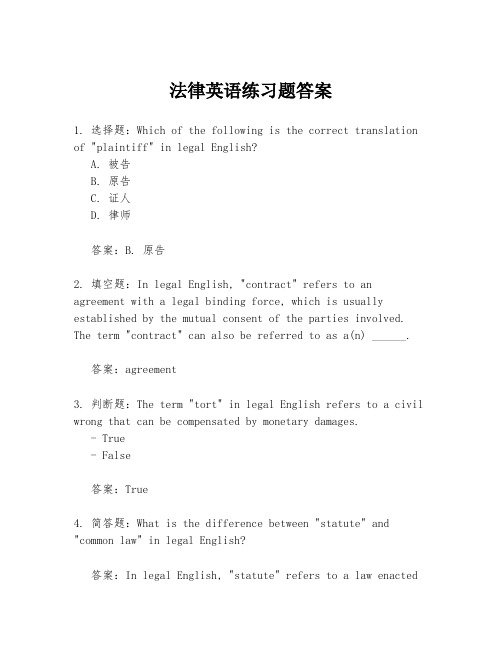
法律英语练习题答案1. 选择题:Which of the following is the correct translation of "plaintiff" in legal English?A. 被告B. 原告C. 证人D. 律师答案:B. 原告2. 填空题:In legal English, "contract" refers to an agreement with a legal binding force, which is usually established by the mutual consent of the parties involved. The term "contract" can also be referred to as a(n) ______.答案:agreement3. 判断题:The term "tort" in legal English refers to a civil wrong that can be compensated by monetary damages.- True- False答案:True4. 简答题:What is the difference between "statute" and "common law" in legal English?答案:In legal English, "statute" refers to a law enactedby a legislative body, whereas "common law" refers to the body of law derived from judicial decisions of courts and similar tribunals.5. 翻译题:请将以下句子翻译成英文。
本科法学英语4试题及答案

本科法学英语4试题及答案一、选择题(每题2分,共20分)1. Which of the following is NOT a basic principle of contract law?A. Offer and acceptanceB. ConsiderationC. Legality of the subject matterD. Presence of a written document2. In the context of criminal law, what is the term "mens rea" referring to?A. The actus reusB. The guilty actC. The guilty mindD. The burden of proof3. Which of the following is a fundamental human right?A. The right to privacyB. The right to own propertyC. The right to voteD. All of the above4. What is the legal term for a person who is not a party toa lawsuit but whose rights may be affected by the outcome?A. PlaintiffB. DefendantC. Third partyD. Witness5. In which area of law does the concept of "actus reus" apply?A. Property lawB. Contract lawC. Criminal lawD. Family law6. What is the term used to describe the legal responsibility for one's actions?A. Vicarious liabilityB. Joint liabilityC. Personal liabilityD. Contributory negligence7. Which of the following is a requirement for a valid will?A. It must be in writingB. It must be signed by two witnessesC. It must be notarizedD. The testator must be of sound mind8. What is the legal term for a dispute between parties that is resolved through a formal hearing?A. LitigationB. ArbitrationC. MediationD. Negotiation9. Who has the authority to interpret the constitution in a country?A. The parliamentB. The executiveC. The judiciaryD. The citizens10. Which of the following is NOT considered a form of intellectual property?A. TrademarksB. CopyrightsC. PatentsD. Trade secrets二、填空题(每题1分,共10分)11. The ________ rule in criminal law states that there must be a direct causal link between the defendant's actions and the criminal offense.12. A contract is said to be void if it is based on ________ or illegality.13. The right to a fair trial is protected under the ________ of the Universal Declaration of Human Rights.14. In property law, the term "easement" refers to a right to use someone else's land for a specific purpose without possessing it.15. A ________ is a legal document issued by a court that orders a person to do or refrain from doing a certain act. 16. The principle of "innocent until proven guilty" is a cornerstone of ________ law.17. A person who is not a citizen but is allowed to live and work in a country is known as a(n) ________.18. The doctrine of "stare decisis" is a fundamentalprinciple of ________ law.19. A "tort" is a civil wrong that causes a claimant tosuffer loss or harm, for which the law provides a remedy inthe form of ________.20. The process by which a higher court reviews the decisionof a lower court is known as ________.三、简答题(每题5分,共20分)21. Explain the concept of "due process" in legal proceedings.22. What are the elements of a valid contract?23. Describe the difference between a "public" and a "private" law.24. What are the rights of a suspect during a criminal investigation?四、案例分析题(共30分)25. Mr. Smith is the owner of a small factory. One day, afire breaks out in the factory, which is suspected to have been caused by a faulty electrical system. The fire spreadsto neighboring properties, causing significant damage.Analyze the legal implications for Mr. Smith under both criminal and civil law. (10分)26. Ms. Johnson is a renowned author who recently published a novel that has become a bestseller. However, another author, Mr. Brown, claims that Ms. Johnson's novel is a copy of his unpublished manuscript. Mr. Brown decides to sue Ms. Johnson for copyright infringement. Discuss the legal principles that would apply in this case and the possible outcomes. (10分) 27. A company is facing a class action lawsuit for selling a product that allegedly causes health issues. The company's defense is that they were not aware of the product's harmful effects. Discuss the legal concept of "negligence" and how it might apply to this case. (10分)五、论述题(共20分)28. Discuss the importance of international law in the context of global trade and diplomacy.答案:一、选择题1-5 D C D C。
法律专业英语试题及答案

法律专业英语试题及答案一、选择题(每题1分,共10分)1. Which of the following is a fundamental principle of the legal system?A. EqualityB. JusticeC. FairnessD. All of the above2. The term "judiciary" refers to:A. The legislative branch of governmentB. The executive branch of governmentC. The branch of government responsible for interpreting and applying the lawD. The branch of government responsible for enforcing laws3. In the context of contract law, what is "consideration"?A. The thought process behind a contractB. The legal element that something of value is exchangedC. The written document of a contractD. The person who is bound by the contract4. What is the term for the legal principle that a person cannot be tried or punished twice for the same offense?A. Double jeopardyB. MitigationC. RecidivismD. Proportionality5. Which of the following is a type of legal document?A. DeedB. NovelC. MemoD. Invoice6. The term "pro se" means:A. Against oneselfB. On behalf of oneselfC. On behalf of anotherD. Against another7. What is the difference between "civil law" and "criminal law"?A. Civil law deals with disputes between individuals, while criminal law deals with offenses against the state.B. Criminal law deals with disputes between individuals, while civil law deals with offenses against the state.C. Both deal with offenses against the state.D. Both deal with disputes between individuals.8. What does the term "habeas corpus" mean?A. A writ requiring a person to be brought before a courtB. A legal document that ends a lawsuitC. A legal document that begins a lawsuitD. A writ that allows a person to be detained withouttrial9. In legal terms, "precedent" refers to:A. A legal principle or rule established in a previouscaseB. A legal document that is used as evidenceC. A legal principle that is always followed without exceptionD. A legal principle that is never followed10. What is the term for a legal dispute between two or more parties?A. LitigationB. MediationC. ArbitrationD. Negotiation二、填空题(每题1分,共5分)11. The legal principle of "innocent until proven guilty" is known as ________.12. A person who is not a lawyer but represents themselves in court is said to be acting ________.13. The process of a court determining the rights and obligations of parties in a dispute is called ________.14. A legal document that outlines the terms of a contract is known as a(n) ________.15. The area of law dealing with disputes over property is known as ________.三、简答题(每题5分,共10分)16. Explain the concept of "estoppel" in legal terms.17. What are the key differences between "common law" and "civil law" systems?四、案例分析题(每题15分,共15分)18. A company has been accused of breaching a contract with a supplier. The supplier claims that the company has failed to pay for goods delivered. The company argues that the goods were not delivered as per the agreed terms. Analyze the situation from a legal perspective, considering theprinciples of contract law.五、论述题(每题20分,共20分)19. Discuss the role of the judiciary in a democratic society and its importance in upholding the rule of law.答案:一、1. D2. C3. B4. A5. A6. B7. A8. A9. A10. A二、11. Presumption of innocence12. Pro se13. Adjudication14. Contract15. Property law三、16. Estoppel is a legal principle that prevents a person from asserting a claim or right that contradicts a previous position or statement they have made, especially when it would be unfair to allow them to do so.17. Common law systems rely heavily on judicial precedent, while civil law systems are based on comprehensive written codes. Common law is primarily developed through case law, whereas civil law is developed through legislative statutes.四、18. In this case, the supplier would need to provide evidence of the contract and proof of delivery of the goods. The company would need to show that the goods were not delivered according。
高一英语法律意识练习题50题带答案
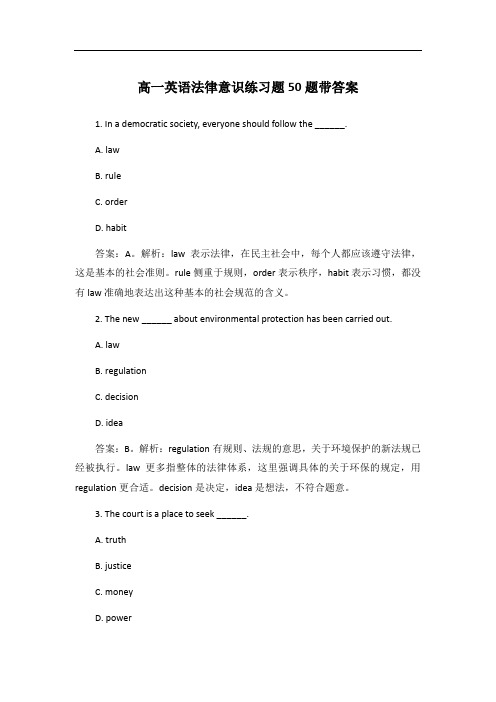
高一英语法律意识练习题50题带答案1. In a democratic society, everyone should follow the ______.A. lawB. ruleC. orderD. habit答案:A。
解析:law表示法律,在民主社会中,每个人都应该遵守法律,这是基本的社会准则。
rule侧重于规则,order表示秩序,habit表示习惯,都没有law准确地表达出这种基本的社会规范的含义。
2. The new ______ about environmental protection has been carried out.A. lawB. regulationC. decisionD. idea答案:B。
解析:regulation有规则、法规的意思,关于环境保护的新法规已经被执行。
law更多指整体的法律体系,这里强调具体的关于环保的规定,用regulation更合适。
decision是决定,idea是想法,不符合题意。
3. The court is a place to seek ______.A. truthB. justiceC. moneyD. power答案:B。
解析:justice表示正义,法院是寻求正义的地方。
truth表示真相,虽然法院也追求真相,但justice更能体现法院的职能,即维护公平正义。
money 金钱和power权力都与法院的职能不相符。
4. If you break the ______, you may be punished.A. lawB. promiseC. gameD. friendship答案:A。
解析:break the law是固定搭配,表示违反法律。
如果违反法律就可能受到惩罚。
promise是承诺,break the promise是违背承诺;game是游戏,friendship是友谊,都不符合这里的语境。
5. A good citizen should respect all the ______ in the country.A. lawsB. leadersC. buildingsD. trees答案:A。
九年级英语法律常识入门练习题20题(答案解析)
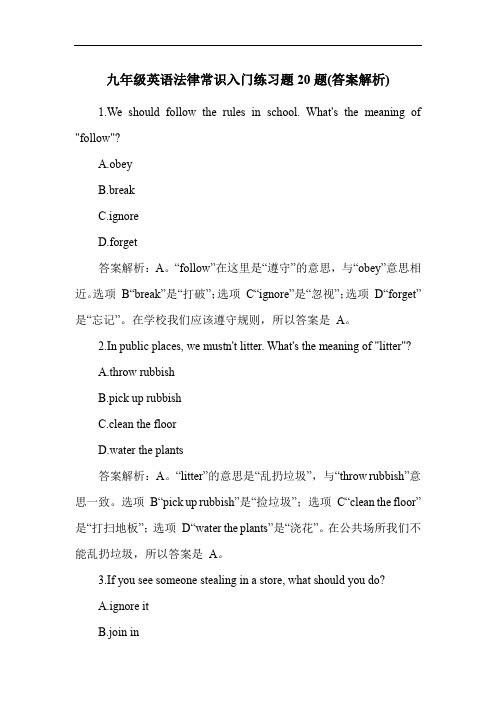
九年级英语法律常识入门练习题20题(答案解析)1.We should follow the rules in school. What's the meaning of "follow"?A.obeyB.breakC.ignoreD.forget答案解析:A。
“follow”在这里是“遵守”的意思,与“obey”意思相近。
选项B“break”是“打破”;选项C“ignore”是“忽视”;选项D“forget”是“忘记”。
在学校我们应该遵守规则,所以答案是A。
2.In public places, we mustn't litter. What's the meaning of "litter"?A.throw rubbishB.pick up rubbishC.clean the floorD.water the plants答案解析:A。
“litter”的意思是“乱扔垃圾”,与“throw rubbish”意思一致。
选项B“pick up rubbish”是“捡垃圾”;选项C“clean the floor”是“打扫地板”;选项D“water the plants”是“浇花”。
在公共场所我们不能乱扔垃圾,所以答案是A。
3.If you see someone stealing in a store, what should you do?A.ignore itB.join inC.call the policeD.help the thief答案解析:C。
看到有人在商店里偷东西应该报警。
选项A“ignore it”是忽视它;选项B“join in”是加入;选项D“help the thief”是帮助小偷,这些都是错误的做法。
所以答案是C。
4.At home, parents have the right to discipline their children. What's the meaning of "discipline"?A.punishB.spoilC.ignoreD.protect答案解析:A。
法律英语模拟试题及答案
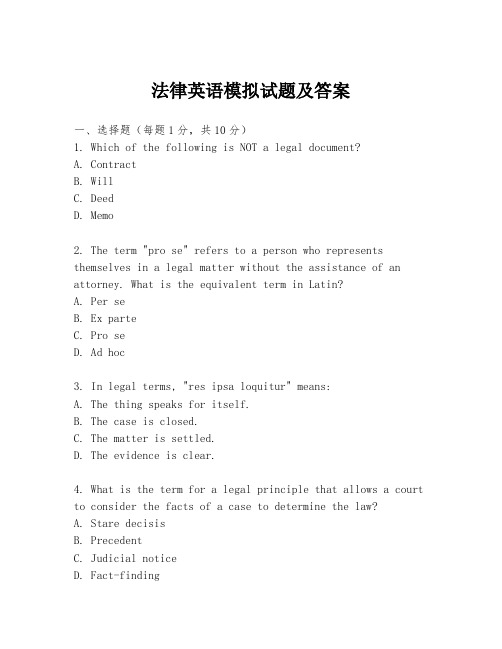
法律英语模拟试题及答案一、选择题(每题1分,共10分)1. Which of the following is NOT a legal document?A. ContractB. WillC. DeedD. Memo2. The term "pro se" refers to a person who represents themselves in a legal matter without the assistance of an attorney. What is the equivalent term in Latin?A. Per seB. Ex parteC. Pro seD. Ad hoc3. In legal terms, "res ipsa loquitur" means:A. The thing speaks for itself.B. The case is closed.C. The matter is settled.D. The evidence is clear.4. What is the term for a legal principle that allows a court to consider the facts of a case to determine the law?A. Stare decisisB. PrecedentC. Judicial noticeD. Fact-finding5. Which of the following is NOT a type of legal system?A. Common lawB. Civil lawC. Religious lawD. Equitable law6. The phrase "habeas corpus" is used to challenge:A. The legality of detention.B. The validity of a contract.C. The jurisdiction of a court.D. The admissibility of evidence.7. The term "actus reus" in criminal law refers to:A. The guilty mind.B. The guilty act.C. The motive for the crime.D. The opportunity for the crime.8. In the context of a legal dispute, "burden of proof" refers to:A. The responsibility to prove a claim or defense.B. The responsibility to pay legal fees.C. The responsibility to provide evidence.D. The responsibility to show up in court.9. "Caveat emptor" is a legal principle that means:A. Let the buyer beware.B. Let the seller beware.C. The contract is void.D. The transaction is complete.10. The term "precedent" in legal terms means:A. A legal principle or rule established in a previous legal case.B. A legal document that sets a standard.C. A legal agreement between parties.D. A legal decision that is final.二、填空题(每题1分,共5分)11. A legal document that outlines the terms and conditions of a sale is called a(n) ______.12. The legal principle that states that a person is innocent until proven guilty is known as ______.13. The term "eminent domain" refers to the power of the state to take private property for ______.14. In legal terms, "estoppel" is a principle that prevents a person from denying the truth of a previous ______.15. A "plea bargain" is an agreement in a criminal case where the defendant agrees to plead guilty to a lesser charge in exchange for a ______.三、简答题(每题5分,共20分)16. Define the term "due process" in the context of legal proceedings.17. Explain the concept of "joint and several liability" in the context of a legal claim.18. What is the purpose of a "cease and desist" letter in legal disputes?19. Describe the role of a "guardian ad litem" in a legal case involving a minor.四、案例分析题(每题15分,共30分)20. A company is being sued for copyright infringement. The company claims that they were not aware of the infringement and that it was an honest mistake. Discuss the possible defenses the company might raise and the likelihood of their success.21. A landlord is suing a tenant for unpaid rent. The tenant claims that the apartment was uninhabitable due to a leaking roof and poor heating. Analyze the tenant's potential defenses and the possible outcomes of the case.五、论述题(15分)22. Discuss the importance of understanding legal English in the context of international business transactions. Include examples of common legal terms and their implications in contracts.答案:一、选择题1-5: D C A D C6-10: A B B A A二、填空题11. Contract12. Presumption of innocence13. public use14. representation15. reduced sentence三、简答题16. Due process refers to the fundamental, constitutionalright of all individuals to receive fair treatment by the justice system. It includes the right to notice, the right to be heard, and the right to a fair and impartial tribunal. 17. Joint and several liability means that in a legal claim, each party responsible for the harm caused can be held liable for the entire amount of the damages, regardless of their individual contribution to the harm.18. A cease and desist letter is a formal warning sent by one party to another, demanding that the recipient stop an。
- 1、下载文档前请自行甄别文档内容的完整性,平台不提供额外的编辑、内容补充、找答案等附加服务。
- 2、"仅部分预览"的文档,不可在线预览部分如存在完整性等问题,可反馈申请退款(可完整预览的文档不适用该条件!)。
- 3、如文档侵犯您的权益,请联系客服反馈,我们会尽快为您处理(人工客服工作时间:9:00-18:30)。
法律英语考查试题及答案一、英译汉1.general jurisdiction 一般管辖2.bar examination 律师考试3.ripeness 案件成熟度4.substantive law 实体法5.no contest pleas 不辩护也不认罪的答辩二、汉译英1.巡回法院circuit courts2.模拟法庭moot court3.案件决议度mootness4.起诉书complaint5.被上诉人appellee三、翻译短文1.No two legal systems,then,are exactly alike.Each is specific to its country or its jurisdiction.This does not mean,of course,that every legal system is entirely different from every other legal system.Not at all.When two countries are similar in culture and tradition,their legal systems are likely to be similar as well.No doubt the law of E1Salvador is very much like the Law of Honduras.The laws of Australia and New Zealand are not that far apart.没有两个法系是恰好相似的。
每一种法系对于它的国家和它的管辖范围是特定的。
当然,这并不意味着每一种法系是完全不同于其它任何一种法系。
当两个国家在文化和传统上相似的时候,他们的法系也很可能相似。
难怪萨尔瓦多的法律和洪都拉斯的法律异常相似。
澳大利亚的法律和新西兰的法律也不是相差甚远。
2.In many jurisdictions in the United States,felonies are crimes punishable by death or imprisonment in a state prison or penitentiary and misdemeanors are those punishable by fine of imprisonment in a local jail.(The term jurisdiction refers to the authority of a political entity,such as a state or a county ,or the territory over which that authority is exercised.)In other jurisdictions,crimes punishable by fine or imprisonment in a local jail.(The term jurisdiction regers to the authority of a political entity,such as a state or a county,or the territory over which that authority is exercised.)In other jurisdictions,crimes punishable by imprisonment for one yeat or more are folonies,and those punishable by fine or imprisonment for less than one year are misdemeanors.Since each jurisdiction determines the penalties for offenses it defines,a misdemeanor in one jurisdiction may constitute a felony in another.Some jurisdictions have an additional classification for petty offenses,also called infractions,which are usyally punishable by a small fine.在美国的许多地区,重罪是被处以死刑或者在州监狱里终身监禁的犯罪,而轻罪是被处以罚款或者是在当地监狱监禁的犯罪。
(这个管辖术语涉及政治性实体的权威,例如一个州或者一个国家,或者一个培训权威的领地。
)在其他地区,被处以监禁一年或一年以上的是重罪,被处以罚款或监禁少于一年的是轻罪。
因为每个地区各自定义决定罪犯的刑罚,在一个地区的轻罪可能在别的地区是重罪。
一些地区对轻微违法有另外的分类,称作侵害,通常被处以数量不大的罚款。
3.The system of criminal procedure in the United States is both adversarial and accusatorial.The adversatial aspects are as follows:the parties themselves develop and present the evidence before a passive and impartial decisionmaker,with the judge acting only as necessary to assure overall fairness of the contest between the sides.Accusatorial principles are not the same as adversarial principles,but they complement each other.Accusatorial principles require the “government in its contest with the individual to shoulder the entire load,”while adversarial principles require that the prosecutor,as the governmen t′s representative,present the case against the defendant.Thus,the prosecutor must bear the entire burden of proving the defendan t′s guilt on every element of the crime without the compelled assistance of the accused.The U.S. system allows for exceptions to the accusatorial principle,just as it contemplates exceptions to the asversatial principle,but it remains primarily accusatorial and adversarial.在美国,刑事诉讼体系包括对抗式(当事人主义)和控告式(职权主义)。
当事人主义包括以下几个方面:当事人自己在一个消极的公正的决策者之前收集和呈现证据,而法官仅扮演一个能够保证争议双方公正的必要角色。
职权主义原则与当事人原则不同,但双方是互补的。
职权主义原则要求政府在个别争议中承担全部责任。
然而当事人主义原则要求政府代表的检察官呈现针对被告的案件。
因此,公诉人必须承担证明被告有罪的全部责任,并且在每一个犯罪要素上排除被告被强迫的帮助。
美国体系容许排除职权主义原则,正如他沉思排除当事人主义原则,但它仍保持着主要的职权主义原则和当时人原则。
4.Direct Examination and Cross ExaminationThe plaintiff′s lawyer calls her or his witness and question the witness.This is know as direct examination.When the plaintif f′s lawyer has finished,the defendan t′s lawyer may cross-examine the plaintif f′s witness .On cross-examination ,the defendan t′s lawyer is free either to limit his questions to topics raised by the plaintif f′s lawyer or to limit his questions to topics raised by the plaintif f′s lawyer of to open a new line of questioning.When the defendant`s lawyer has finished,the plaintiff`s lawyer may redirect,or ask assitional questions of the same witness.On redirect examination,however,the plaintiff`s lawyer may ask only questions raised by the defendant`s lawyer on cross-examination;she or he may not open a new line of questioning.Upon completion of redirect,the defendant`s lawyer may recross-examination;she or he may not open a new line of questioning.Upon completion of redirect,the defendant`s lawyer may recross-examine but also is limited to questions raised on redirect.When both lawyers have asked all of their questions,the witness is excused.原告律师可以直接要求她或者他的证人出庭和询问证人。
